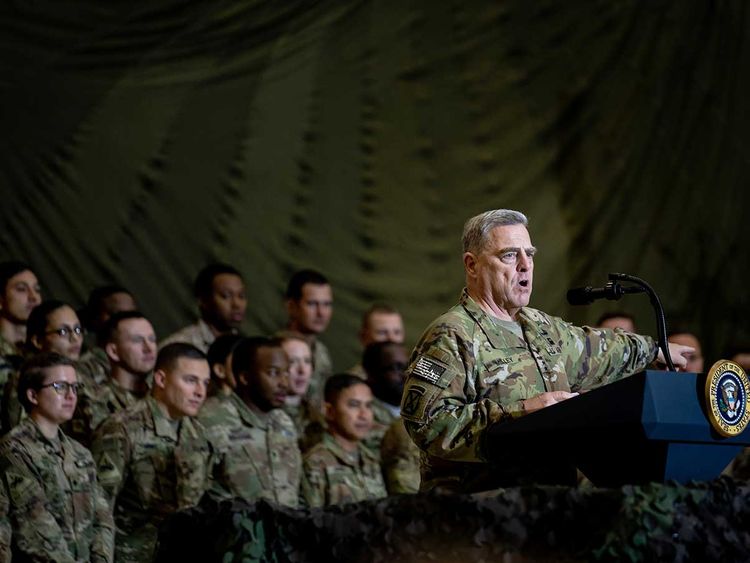The drama finally reached its feeble denouement, not with a bang but a whisper, as the top US commander in Afghanistan, Gen. Scott Miller, relinquished his post at a ceremony in Kabul on Monday, close on the heels of his troops’ near complete withdrawal from the country, bringing to an end the mother of all misadventures in the history of the United States.
Oh, yes, the once brash nation-builder is homeward-bound.
In a speech outside the White House on Thursday, President Biden, who prefers to talk about “happy things”, effectively told his fellow-Americans not to fret over whether the price they had paid in blood and treasure had all been in vain. And, no, Afghanistan is decidedly not spiralling toward civil war and headed for an inevitable Taliban takeover, as many — very many — doomsayers in the media are predicting and as his own intelligence community had warned would happen.
The Taliban offensive
Less than 24 hours after the president’s speech, Taliban forces, as if to interject, penetrated Kandahar, Afghanistan’s second largest city, in a sweeping offensive that began weeks earlier, during which they were able to seize 160 of the country’s 400 districts, often with little or no resistance from government troops, leaving the group with control of one-third to one-half of the country.
American troops began their mass withdrawal on July 2, from the one place that had been, from the outset, the epicentre of their war effort in Afghanistan: Bagram Air Base, rebuilt in 2006 at a cost of $286 million, not just as a military facility but as home away from home for the 100,000-plus servicemembers who had at one time or another passed through its gates, where they enjoyed the same life of abundance that they had known in the US.
The troops departed in stealth, in the dead of night, leaving a wasteland behind.
Two decades of war had indeed exacted a heavy price in blood and treasure for Americans — as for Afghans. The war left roughly 2,400 servicemembers dead and 20,000 wounded. Well over 71,000 Afghan civilians were killed by crossfire, improvised explosive devices (IED’s), assassinations and bombings, and 60,000 troops in battle.
And those three trillion dollars American taxpayers had coughed up to pay for their government’s intervention in that impoverished land? It was spent on a dizzying array of nation-building projects.
Billions blown in the badlands
In addition to the billions of dollars lavished on equipping and training the Afghan Army, still more were spent on infrastructure, from dams, canals and highways — which soon were left in disrepair — to hospitals, schools and community centers — which just as soon stood empty — with all that money either going to waste or breeding corruption.
As we speak, Afghanistan is poised to return to the status quo ante that prevailed two decades earlier — with the Taliban ascendant. It is as if nothing had happened in the interim. All for naught. Zilch.
Once upon a time, say before and for a time after the First World War, most Americans preferred to live the safe, isolated lives that the moat of two oceans gave them, where “America goes not abroad in search of monsters to destroy”.
The words are those of John Quincy Adams, the sixth president of the United States, who served between 1825 and 1829 and whose astute ideas about the necessity of insinuating humanist into the public discourse as into the projection of America’s power profile around the world continue to retain enduring relevance in our time among progressives, including progressives who currently serve as legislators on Capitol Hill.
His body of thought was invoked — in a frenzy of where-is-John Quincy Adams-when- you-need-him moment — by progressives everywhere this month, for it was almost exactly two centuries ago, on July 4, 1821, when Adams, then secretary of state, delivered his iconic speech to Congress about the follies of a big power that “always thinks it has a great soul and vast views beyond the comprehension of the weak … for were [America] to become the dictatress of the world, she would be no longer the ruler of her own spirit” and about how “American glory is not dominion, [for] her march is the march of the mind”.
Were John Quincy Adams alive today, he would no doubt look with puzzled contempt at how American foreign policy, certainly since the second half of the last century, had been made to perform tasks of ever increasing tawdriness.
And intervening, not to mention regime-changing — especially when enacted stealthily by the boys from Langley — in other countries may be a norm for a big power, but both its means and meaning embody tawdriness in the extreme.
I say the ideals that animate the inspiring vision of this eloquent American statesman still apply today and they need to have a leading positional value in American foreign policy as America seeks in the 21st century to continue being leader of what it calls the free world.













